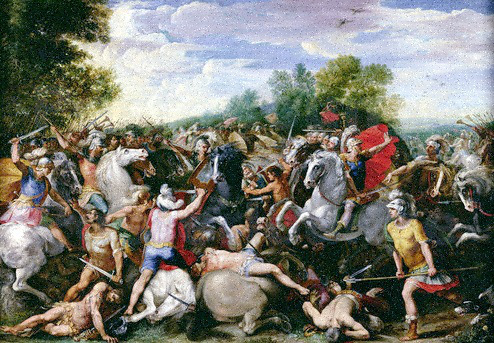Tullus Hostilius was elected the third king of Rome by interregnum; he was the grandson of a soldier who had fought with Romulus and according to Livy “his lust for action surpassed Romulus himself”. He believed Rome had failed to remain strong in Numa Pompilius’s reign— a wrong he was extremely wiling to right.

To start his first war, Tullus Hostilius took advantage of a few cattle raids that had occurred along Rome’s border with Alba Longa. At about the same time both parties sent representatives to negotiate on account of the stolen property. The Roman envoy delivered their demands almost immediately and was denied by Cuilius while the diplomats from Alba Longa delayed their objective to enjoy Rome’s cordiality. When the Romans returned with Cuilius’s rejection, Tullus Hostilius inquired about the Albans’ enterprise. Once they had replied, he was able to declare war without angering the gods because he was not the first to “refuse the demand for redress”. In the ensuing war which was “like father against son”, Rome won, killed Cuilius, and declared their supremacy over Alba Longa.

In Rome’s next conflict they expected the Albans to be their allies. The Fidenae and the Veii declared war with Mettius Fufetius’s promise of support. Mettius decided to wait until there was a clear victor to choose a side. With the report of the Albans’ abandonment, Tullus rallied his troops with a lie; he announced to his soldiers that the Albans were following his orders and attacking from the back. He spoke loud enough for the enemy to hear which led Rome’s enemies to retreat and animated the Romans to fight more fiercely. Rome won the “bloodiest battle Rome had yet fought”. When Tullus Hostilius called his army together after the victory, he revealed the truth of the Albans’ betrayal. The guilt was placed on Mettius alone because he was the one who gave the order and in Tullus Hostilius’s mind, not capable of learning to be loyal to Rome. As punishment Mettius was tied to two chariots and pulled in opposite directions. Then the population of Alba Longa was transferred to Rome, and the city was destroyed. Citizens grabbed their most precious possessions and watched as all but the temples tumbled to the ground.

The new citizens assimilated into the Roman culture. Tullus Hostilius added the Caelian Hill to the city, and because the upper class families of Alba Longa joined with the Roman nobility, the Curia Hostilia, the new Senate House, was built. Also, the army formed ten new squadrons called the Alban Knights. With this new strength Tullus Hostilius decided to attack the Sabines; Rome won “without severe losses”.

Immediately after their victory, a meteor shower cascaded upon the Alban Mount, and when it was investigated, a voice called for the return to religion. When the plague struck, Tullus Hostilius tried to keep up the army, but he fell sick himself. This prompted a change in the king; he rediscovered Numa’s religious establishment. To try to appease the gods, Tullus Hostilius performed the rites of Jupiter Elicius, but he did something wrong. “Jupiter was angry; the palace was struck by lightning, and Tullus perished in the flames”.
As a legendary king most of the information about Tullus Hostilius is questionable. Historians call into question the similarities between him and Romulus, but the family name Hostilii exists in Roman records, and archeology has proven that the destruction of Alba Longa happened around the time of Tullus Hostilius’s reign. Therefore, it is very possible that this legendary king did exist.

Questions
1. Against what four groups did Tullus Hostilius wage war?
2. What were the Albans and the Romans arguing about?
3. How was Mettius punished?
4. Which god was angered and in turn killed Tullus Hostilius? How did he die?
5. How were the Albans and the Romans related?
6. How might Tullus Hostilius’s troops reacted if he had not lied to them? How could this have changed the outcome?
7. Why would Tullus Hostilius let the temples stand when he destroyed Alba Longa?
8. What similarities and differences are there between Tullus Hostilius and Romulus?
Cavazzi, F. "The Roman Kings." Roman Empire. n.p., 7 Apr. 2012. Web. 14 Sept. 2013.
Livy. An Early History of Rome. Trans. Aubrey de Selincourt. London: Penguin, 2002. Print.
"Tullus Hostilius." The Oxford Classical Dictionary. 3rd ed. 1996. Print.
"Tullus Hostilius." World History: Ancient and Medieval Eras. ABC-CLIO, 2013. Web. 17 Sept. 2013.
Comments (0)
You don't have permission to comment on this page.